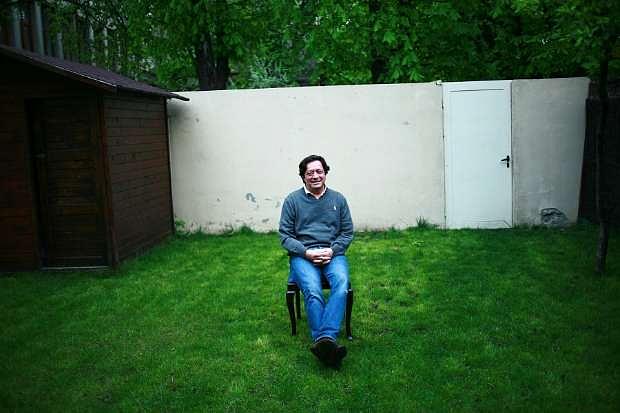Eric Royer gets outside the boxes - it’s never only one!

Meet a vegetarian French commercial director who slept countless times under the open sky.
Eric Royer traveled around the world for more than ten years: Africa, India, Australia and Thailand. He went to all the countries where young people were going in the 70s and even more. First he traveled with his girlfriend, an Algerian girl, then with his Australian girlfriend and in the end he traveled to Romania by himself, 20 years ago. Still, he almost never talks about this.
Eric is a 56-year old French guy, straight-forward and not sentimental at all – at least he doesn’t show it. He has been living in Bucharest for a long time, working as a commercial director in construction and real-estate companies. Now he lives in a beautiful house, in a rather green area of Bucharest. After years of traveling, he settled down - he has three kids, a wife, a house. That’s one way of seeing it.
So if you traveled the world, would you boast about it? Eric chooses not to talk about it with his work colleagues, his friends, nor his kids. Ironically he turns to this topic with people he doesn’t like. “When I get upset with some square people I tell them I don't understand them. Why, they ask. Because we don't have the same life. You believe in your square things, I believe in a part of them too but not as much as you. I traveled for ten years. Sometimes you had to wait for a car on the side of the road for five days. And you sleep and you eat there fearing no one will take you. I tell them about it briefly and then we stop and we talk about something else.”
This is Eric and he did travel the world for ten years. And this is his story.
A skateboard lies in the yard just outside Eric’s door. “Are you the carpenter?” the man who opens the door asks me. “I was waiting for the carpenter, I totally forgot about the interview,” Eric says as he invites me in. “How do you say carpenter in Romanian?”, he asks. “Tamplar,” I answer.
I enter the house, which is a bit shaded, as it’s already late afternoon. A young boy nears us. He has dark hair and dark eyes that sparkle. He seems extremely curious, just like his dad, but they don’t look much alike. Eric has a more severe appearance which is sometimes softened by a warm smile. He seems kind, but also tough, while the kid is gentle as a deer.
When I ask the boy if the skateboard is his, Eric answers for him: “The first one had it, the second one plays with it, and the third one is starting.” Emilio, whom I just met, is the third one and the youngest one. He’s ten. The older one, 16, is upstairs with a friend and the middle one, 13, is probably sleeping. Nobody answers when his dad calls him. “10 years is ok, but 16 is a nightmare,” Eric says.
In the living room, South-American statues of colorful supernatural beings catch the eye, and so do the many photos: Eric in his late thirties and his wife, the kids at the beach, and among them an old black and white photo of a bride and a groom- the South-American parents of his wife.
Eric met his wife in Romania, but she’s from Peru. She has been working for BRD, but she was recently transferred to Groupe Société Générale, in Paris. “It’s funny, but South America is the one part of the world where I didn’t travel yet,” Eric says.
As we exchange a few introductory words, Eric suddenly interrupts. “Would you like an apple juice?” “Yes”. Then I hear him shouting something in French. I understand only “Emilio, bring a juice for the madame ou mademoiselle”.
“Actually tomorrow is my 20th birthday here, so I'll throw a little cocktail. I met my wife here, got married in Romania.” So begins Eric his story.
Chapter 1: The hitchhiker
“When I was in school - but I don't want my kids to listen to that - I didn't understand what life was about. I was going to school - it was dark, it was 7.30 a.m. and when I was coming out of school it was also dark. It was always dark and all day long working. So I went hitchhiking.” “Where did you first go?” I ask Eric. “Africa,” he answers. “My girlfriend was Algerian, she had never seen her country, she was born in Paris, so we went there. “
I can hear his boys upstairs laughing and talking loud, while Eric goes on. “I think life is not only about being squeezed inside a house and work all day, and I was not pleased with this kind of life.” “So you went to see the world?” “Not necessarily the world, but to see what's going on day to day outside - not inside. It's like, you are always in a little box. You're born inside your stomach, you go to the school, you go out to the discotheque, you go to the office - you are always inside a box, and you end up your life inside a box. I wanted to be outside the box and travel. So I traveled.”
He says all these things with simplicity and makes them seem normal stuff everybody could do. “Well, ten years traveling is quite a thing,” I tell him. “I had no intention at the beginning to stay that long, but the first trip took one year and a half. I hitchhiked across all Algeria, all the desert, then Black Africa, then I came back through the desert to Morocco. But it took time, ehh?”
“In the desert if you wake up past 6 o'clock in the morning you missed all the cars, or the trucks, because people are leaving early morning. And people in the desert don't like to pick up people. They like to be alone, listen to their music, stop where they want and not have a guy and a girl with them.”
“Do you remember what you had in your bag?” I ask him. “No…” he laughs. “Strictly minimum. My toothbrush. It was really small. And my sleeping bag, which was not even a sleeping bag, it was a sheet, because the desert is warm. Black Africa is warm. We slept inside people's house or outside. There was no need to ask. People saw that we were not traveling in an Audi and offered us a place. I was doing that to communicate, to share things with people. I was 18 years-old.”
“What did your parents say?” “Nothing, I didn't tell them. I left and I wrote them a postcard. I was sick of this life. I wanted to meet people. What is an Indian thinking, what is a Japanese thinking? Even if I’m not good in speaking foreign languages, I Iike to meet people, to see how they think. And having no money and being a hitchhiker is the best way.”
“What if you receive such a postcard from your oldest boy in two years, he’s 16 now”, I ask him. Eric laughs…”I'd be proud of him.” “But today it must be more difficult traveling,” he adds “When did you travel?” “Ohh..that was 40 years ago. It was the ‘75. There were a lot of students, a lot of Americans; when finishing their studies, they used to go traveling for 6 months, one year.”
“Were you ever scared in the desert?” “No, no! The worse was in Algeria, because my girlfriend was Algerian, born in Paris and the family wanted her to find a good Algerian boy. That was the biggest fear, meeting her family. But 40 years ago it was more peaceful. We were never robbed. But we were poor. We had no cash, we had travel checks. And we had long hair.”
After the first trip ended, he returned to Paris, worked in a restaurant, and then went traveling again . “Everybody was talking about India so we went there. It was a long trip, we went hitchhiking: Greece, Turkey, Iran, Pakistan, India. The trip took two years- one year in India, and one year to go and come back.” “Wow...that’s a long time,” I say amazed. “Your goal is not to go fast. You just go.”
“We met all the Krishna devotees, Buddhists. I became vegetarian in India. Why kill so many animals when you can live without meat? When you're 20, 25 you think about these things. We had time, enough money to survive and we were traveling to understand what it was all about.” “So did you understand?” He laughs. “Not sure I got it all. But I'm a little more sure about life. But no, no. I haven’t understood life…yet.”
“The fact is you cannot work in Black Africa, unless you have your business, nor in India. But I thought about Australia - if I ran out of money there, I could work.” So Eric’s next destination was Australia. “A guy I knew from Karachi, Pakistan had a factory in Australia and he sent me to open a retail in Australia. I was 24.”
“So you slowly became more business focused,” I add. “Business was my worse saying at the time. I went with a big bag full of samples…after one month I dropped it and I went to pick up crabs.”
“Did time feel differently while you were traveling?” “Time doesn't exist. The weather is more important. Is it raining or is it not raining? That is more important. The freedom was total, sleeping on a beach along the road, under the sky. I slept on so many beaches in Australia, India, Africa.”
“Do you miss those days,” I ask him. “I'm too old now. I have three kids.” “Do you think you took full advantage of things?” “I never tried to take things, to take advantage of things or anything. I wanted to be free and..I've been free.”
While in Australia, they totally ran out of money and there you do need some money. “Probably you also get a little more materialistic when you are 25, 26, so I started working in a French restaurant in Australia, then fell in love with the owner of the restaurant.”
She had two kids so they ended up moving to Paris where they stayed for ten years. “You know, you come back to Paris after 10 years traveling. You have no diploma, but your mind is totally open and you realize people are very much square. I did a good approach to the job and to the material life. I was working for different companies until I got sick of Paris and material life and I came to Bucharest 20 years ago.”
Chapter 2: The expat
With a few words Eric shifts his story to Romania.
He was tired of material life and here he was, back to material life. “But Paris is more stressful. Money, money, money. People are only working in Paris, to have a bigger car, a bigger house- no pleasure. It’s not my way of seeing life. I understand people doing it, but it’s not my way. In Romania it's more relaxed.”
“What was important for you after you stopped traveling?, I ask him. “To be free again. That’s why I left France and came to Romania. They told me, if you can stay there for 6 months it's a miracle. But we had a lot of fun. I remember how we were driving around Unirii - no malls, no offices building, it was no man's land. At the beginning, the expat community was more mixed. Italian, French, Romanian were hanging out together, but today it is less like that. The community changed. The Scottish stay with the Scottish and so on.”
Eric never talks to friends about his travels. “I don’t think it’s the best part on your CV. People don't understand that. Only when I get upset with some square people I tell them about it.”
Did life change a lot when kids were born? “In my head no, but you have to take care of them, give them food everyday, show a good example. They don't know anything about my past. They don't know about my travels.” It seems hard to believe that his kids don’t have a clue about this big part in his life. “They don't know. When they finish their studies, I’ll tell them.”
Chapter 3: The dad
“The boxes …aren't you afraid of these boxes anymore?,” I ask him. “Last time when I was talking to my kids I told them I wouldn’t want to be in a box. I don't want to take a 2 square metres box in this Earth. I told them, please burn me and just drop the ashes in the river. I hope I escape the last box. But for sure when driving a car you’re in a box, in my house I'm in a box, but getting older, you have to be more flexible. You have to compromise…c'est la vie.” Eric says he tries not to criticize people's decisions. “You're born alone, you die alone and between these two things happening in life you have to manage, so why should I criticize you?”
He goes to the door as the bell starts ringing. “I believe in reincarnation, only your body dies. We were born long, long long time ago. This is my carpenter I suppose.” It was his carpenter indeed.
Eric had a big accident three years and a half ago while he was biking in the Herastrau park. He was in a coma for five weeks, and has been on medical leave since then. “I suppose an accident is always stupid. Luckily I woke up from the comma, I recognized my wife, my mother and I remembered I was vegetarian. And France is the worst country to be a vegetarian. Even in Romania it was difficult 20 years ago.”
“My life now? I’m very busy. You organize your days. I do sport, I take more care of my kids. My wife has been transferred to Paris and we’re moving there too. End of July we’re going back to Paris, but we’ll keep this house. Many people told me they would come back and I haven't seen anybody coming back...”
As Eric gives me a ride to the metro station, I ask him if he has any picture from his travels. “I had a camera, but I sold it. I needed money for my first trip.”
By Diana Mesesan, features writer, diana@romania-insider.com













